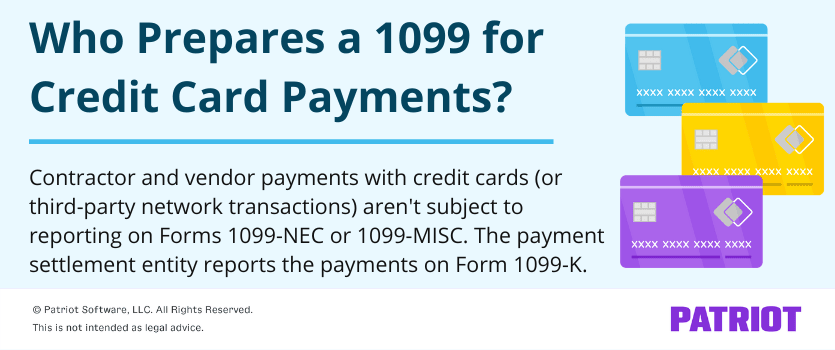Paying a contractor to perform work for your business comes with a little disclaimer: reporting said payments on Form 1099-NEC. But what if you pay your contractor using a credit card? Do you have to prepare a 1099 for credit card payments?
If you’re not sure what your responsibilities are for making electronic payments to contractors and vendors, read on.
Reporting contractor and vendor payments
When you make qualifying payments to independent contractors and certain vendors, you have to report the money on Form 1099-NEC or 1099-MISC.
Fill out Form 1099-NEC, Nonemployee Compensation, if you pay contractors $600 or more for their services. Also file a Form 1099-NEC if you make eligible cash payments for fish or payments to an attorney to cover their fees.
Likewise, report $600 or more in certain miscellaneous payments made to vendors on Form 1099-MISC, Miscellaneous Information. Examples include rents, crop insurance proceeds, and prizes and awards. Also, complete a 1099-MISC if you pay at least $10 in royalties or broker payments in lieu of dividends or tax-exempt interest.
Both Forms 1099-NEC and 1099-MISC go to the IRS, contractor or vendor, and the state tax department (if applicable). You also must keep a copy for your records.
But…
Do you need to prepare a 1099 for credit card payments?
Nope.
You do not need to prepare a 1099-NEC or 1099-MISC for credit card payments. This includes payments you make with:
- Credit cards
- Debit cards
- Store-valued cards (e.g., gift cards)
- Mobile wallets (e.g., PayPal)
Only prepare a 1099-NEC or 1099-MISC if you pay the contractor using cash, check, or a similar payment method.
If you’re not reporting these credit card and related payments, who is? It turns out that the payment settlement entity (e.g., credit card company) is responsible for issuing a 1099…
…But not the one you’re thinking of. Contractors who accept payment cards or payments made by a third-party settlement organization receive a different type of 1099 form known as a 1099-K. The 1099-K, Payment Card and Third Party Network Transactions, reports qualifying electronic contractor and vendor payments.
Payments made with a credit card or payment card and certain other types of payments, including third-party network transactions, must be reported on Form 1099-K by the payment settlement entity under section 6050W and are not subject to reporting on Form 1099-NEC [and Form 1099-MISC].”

A brief overview of Form 1099-K
Here’s the other caveat to Form 1099-K: some contractors and vendors won’t receive it.
There are two types of payment settlement entities:
- Merchant acquiring entities are responsible for payment card transactions
- Third-party settlement organizations (e.g., PayPal) are responsible for third-party network transactions
For calendar year 2023, third-party settlement organizations only report payments on 1099-K to the IRS if both of the following conditions were met:
- The transactions exceed $20,000
- The aggregate number of transactions exceed 200
This means that contractors who received payments of under $20,000 from third-party settlement organizations likely did not receive a 1099-K. And, they also likely didn’t receive a 1099-MISC or 1099-NEC.
New rule alert!! The IRS released new cash app reporting rules that dropped the federal threshold for P2P reporting to $600 and eliminated the transaction minimum of 200. Originally, the new rule was supposed to take effect for calendar year 2022. However, this new rule has been delayed for the past few years. The IRS announced that 2023 will be a transition year, and the new rule will be phased in in calendar year 2024. In 2024, the IRS is planning for a threshold of $5,000 as part of a phase-in to implement the $600 reporting threshold.
Keep in mind that some states have different rules for 1099-K reporting from third-party settlement organizations.
Payment settlement entities must distribute Form 1099-K to contractors and vendors by January 31.
What if you want to send a 1099 for payments made by credit card?
Sending out a 1099-MISC or 1099-NEC for payments made by credit card may result in the contractor receiving double the information returns. The contractor may receive either a 1099-MISC or 1099-NEC and a 1099-K. This could lead to confusion and reporting the same income twice.
However, businesses can issue 1099-MISC or 1099-NEC for card payments if they choose. The IRS states that these payments are not subject to reporting, but it doesn’t outright ban 1099-NEC or 1099-MISC reporting.
What if you’re using accounting software?
Do you use accounting software to handle your books and create 1099s for vendors and/or contractors?
If so, the software should automatically adjust the 1099 type when you record a payment for a vendor or contractor by credit card. By doing this, the software does not include these payments on any Forms 1099-MISC or 1099-NEC for that contractor or vendor.
| Want accounting software that’s seriously smart? When you use Patriot’s online accounting, rest assured that creating and printing Forms 1099-MISC and/or 1099-NEC is a snap. Create and track as many 1099s as you need. And when you record a vendor or contractor payment by credit card, we won’t include the payments on your 1099s (since the filing requirement isn’t on you!). Get your free trial today! |
Will you receive a 1099 if paid by credit card?
Now we’ll look at this from the other side. Let’s say you’re the contractor or vendor receiving electronic payments. Should you expect a 1099 from the business or payment company?
If you receive payments from a payment card or third-party network transaction, you likely won’t receive a 1099-MISC or 1099-NEC (unless the business sends one, anyway). Instead, you may receive a 1099-K.
However, if your transactions for the year from a third-party settlement organization don’t meet IRS requirements for reporting, you probably won’t receive a 1099-K. Regardless, you still need to report the payments to the IRS.
This is where accurate and thorough recordkeeping comes into play. Record all income you receive in your accounting books to ensure you report all payments to the IRS—including those you do not receive a 1099-K for.
Want a 1099-K? Give the payment company your info
When you sign up with a payment settlement entity, you should furnish key information for them to complete the 1099-K. The payment settlement entity needs to know your:
- Name
- Address
- Taxpayer identification number (Social Security number or Employer Identification Number)
This article has been updated from its original publication date of May 13, 2021.
This is not intended as legal advice; for more information, please click here.


